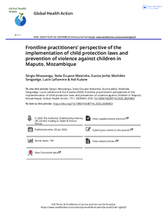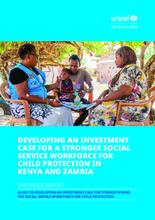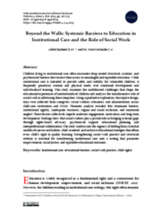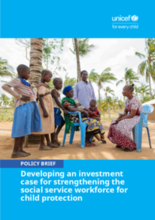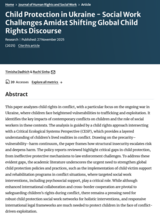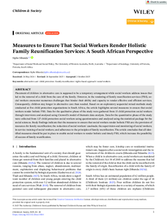Displaying 1 - 10 of 507
This chapter in the The Routledge Handbook of Social Work and Migration focuses on social work with children and young people who have experienced forced migration and become separated from family members, known as unaccompanied minors. It explores the possibilities of rights-based practice with unaccompanied children and considers what might be needed to develop and sustain this.
This article examines how frontline child protection practitioners in Maputo City, Mozambique experience the implementation and enforcement of child protection laws, focusing on perceived barriers and facilitators. It finds that resource constraints, legal gaps, and sociocultural norms hinder effective enforcement, while NGO support and multisectoral coordination act as key enablers, highlighting the need for increased funding, legal harmonization, and evidence-based interventions to prevent violence against children.
This brief presents the case for engaging paraprofessional social service workers as part of a strengthened child protection and care system in Ukraine. The advocacy brief outlines how paraprofessionals—working under the supervision of qualified professionals—can help address workforce shortages, particularly in crisis-affected and resource-constrained contexts.
A strong social service workforce (SSW) is the backbone of effective child protection systems. Across Eastern and Southern Africa, social service workers play a critical role in preventing and responding to violence, abuse, neglect, and exploitation of children. Yet, the workforce remains underfunded and understaffed, limiting its ability to deliver essential services. To address this gap, UNICEF Eastern and Southern Africa Regional Office (ESARO) has developed this Synthesis Report , providing a detailed guide to developing an investment case, drawing on lessons from Kenya and Zambia.
This study examines the educational barriers faced by children in institutional care in India, identifying how structural rigidity, limited resources, stigma, and emotional neglect undermine equitable access to meaningful learning. Drawing on qualitative insights from care and education professionals, it highlights the critical role of social work in advancing child-centred, rights-based approaches to transform institutional care into an environment that supports inclusion, wellbeing, and educational equity.
A strong social service workforce (SSW) is the backbone of effective child protection systems. Across Eastern and Southern Africa, social service workers play a critical role in preventing and responding to violence, abuse, neglect, and exploitation of children. Yet, the workforce remains underfunded and understaffed, limiting its ability to deliver essential services. To address this gap, UNICEF Eastern and Southern Africa Regional Office (ESARO) has developed this Policy Brief summarizing the rationale and approach for building an investment case for strengthening the SSW.
This paper analyzes child rights in conflict, with a particular focus on the ongoing war in Ukraine, where children face heightened vulnerabilities to trafficking and exploitation. It identifies the key impacts of contemporary conflicts on children and the role of social workers in these contexts.
These SOPs aim to strengthen the effectiveness and well-being of Kenya’s child protection practitioners by promoting accountability, continuous learning, and reflective practice. By prioritizing practitioners’ psychosocial health and standardizing supportive supervision across the State Department for Children Services, the guidance seeks to improve service quality, reduce burnout, and enhance outcomes for vulnerable children.
This webinar showcased the learning from Strengthening the Social Service Workforce for Family-Based Care, a two-year project implemented by the Global Social Service Workforce Alliance, with technical support from Child Frontiers, under a grant f
This study examines challenges that hinder social workers in South Africa from providing effective family reunification services, resulting in children staying in alternative care longer than necessary. Findings from a mixed-methods study suggest that providing resources, reducing caseloads, supervising and training social workers, and adhering to reunification principles are key measures to ensure holistic and timely family reunification.

